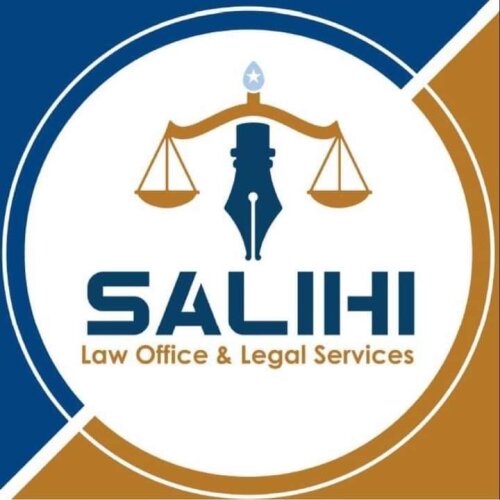Best Financial Services Regulation Lawyers in Somalia
Share your needs with us, get contacted by law firms.
Free. Takes 2 min.
Or refine your search by selecting a city:
List of the best lawyers in Somalia
About Financial Services Regulation Law in Somalia
Financial Services Regulation in Somalia involves the legal frameworks and protocols that govern financial institutions operating within the country. These regulations are crucial as they ensure the stability of the financial system, protect consumers, and help prevent financial crimes and systemic risks. Laws are progressively evolving to accommodate new financial products and technologies, which include banking services, microfinance, insurance, and mobile money, reflecting Somalia's dynamic and gradually formalizing financial sector.
Why You May Need a Lawyer
Engaging a lawyer specializing in Financial Services Regulation can be critical in several scenarios. Businesses entering the Somali market need guidance on compliance with local regulations. Individuals may require assistance when dealing with disputes between consumers and financial institutions or require defense against allegations of regulatory breaches. Lawyers can also assist in navigating complex regulatory changes, responding to regulatory investigations, or understanding operational licensing requirements.
Local Laws Overview
The legal landscape for Financial Services Regulation in Somalia includes a variety of statutes and policies enforced by institutions such as the Central Bank of Somalia. Key aspects of local laws include:
- Licensing and establishment of financial institutions.
- Anti-money laundering (AML) and counter-terrorism financing (CTF) regulations.
- Consumer protection laws ensuring fair treatment by financial services providers.
- Compliance obligations for digital and mobile-money services.
- Corporate governance standards and requirements for transparency in operations.
Frequently Asked Questions
What are the primary regulatory bodies for financial services in Somalia?
The Central Bank of Somalia is the primary regulatory authority overseeing banking and financial sectors, including monetary policy and currency issuance.
How do regulations affect mobile money services in Somalia?
Mobile money services are regulated to ensure security, consumer protection, and compliance with AML and CTF requirements, fostering trust and integration into the formal financial system.
How are financial disputes resolved in Somalia?
Disputes are typically resolved through legal processes or negotiations facilitated by legal experts, with occasional intervention by regulatory bodies as mediators.
What services do financial regulatory lawyers provide?
They offer legal advice on compliance, defense in regulatory investigations, assistance in licensing processes, and aid in restructuring financial arrangements.
Are there specific regulations for foreign financial entities in Somalia?
Yes, including compliance with local laws and protocols, application of international standards, and obtaining necessary operational licenses from local authorities.
What challenges does the Somali financial regulatory system face?
Challenges include evolving from informal to formal systems, limited regulatory infrastructure, capacity constraints, and integrating emerging financial technologies.
How can small businesses ensure compliance with financial regulations in Somalia?
Small businesses should seek legal consultation to understand relevant regulations, record-keeping requirements, and maintain updated compliance practices.
Is there a framework for addressing anti-money laundering in Somalia?
Yes, Somalia has implemented AML frameworks requiring financial institutions to implement due diligence and monitoring processes to prevent laundering activities.
Do Somali financial laws accommodate Islamic banking?
Islamic banking is part of the financial landscape in Somalia, and regulations are conducive to Sharia-compliant financial practices and products.
How can individuals report non-compliance in financial services?
Individuals can report to the Central Bank of Somalia or through legal channels, with the assistance of regulatory lawyers if necessary.
Additional Resources
For more information, consult the following resources:
- The Central Bank of Somalia: Provides guidelines and regulations for the financial sector.
- Financial Reporting Center: Offers resources on AML and compliance standards.
- Local legal firms: Specialized in financial regulatory practices.
Next Steps
If you require legal assistance in the field of Financial Services Regulation in Somalia, consider the following steps:
- Identify and consult with a legal expert who specializes in Somali financial law.
- Prepare documentation related to your legal concern, including correspondence and financial records.
- Stay informed on regulatory updates to ensure continued compliance in your financial dealings.
- Engage with legal professionals who can guide you through complex legal and regulatory landscapes efficiently.
Lawzana helps you find the best lawyers and law firms in Somalia through a curated and pre-screened list of qualified legal professionals. Our platform offers rankings and detailed profiles of attorneys and law firms, allowing you to compare based on practice areas, including Financial Services Regulation, experience, and client feedback.
Each profile includes a description of the firm's areas of practice, client reviews, team members and partners, year of establishment, spoken languages, office locations, contact information, social media presence, and any published articles or resources. Most firms on our platform speak English and are experienced in both local and international legal matters.
Get a quote from top-rated law firms in Somalia — quickly, securely, and without unnecessary hassle.
Disclaimer:
The information provided on this page is for general informational purposes only and does not constitute legal advice. While we strive to ensure the accuracy and relevance of the content, legal information may change over time, and interpretations of the law can vary. You should always consult with a qualified legal professional for advice specific to your situation.
We disclaim all liability for actions taken or not taken based on the content of this page. If you believe any information is incorrect or outdated, please contact us, and we will review and update it where appropriate.
Browse financial services regulation law firms by city in Somalia
Refine your search by selecting a city.










